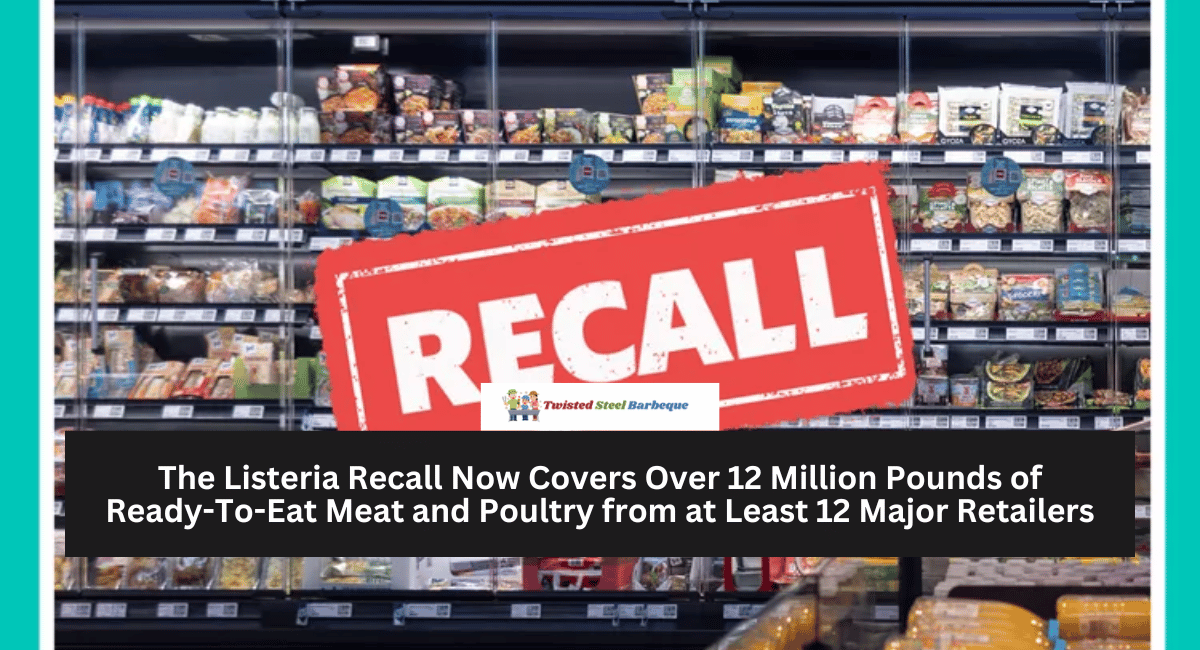BrucePac and the USDA’s Food Safety and Inspection Service (FSIS) have expanded their recent recall to 11,765,285 pounds of beef and poultry, which is troubling. The recall began on October 9 when regular FSIS testing found Listeria monocytogenes in several BrucePac ready-to-eat chicken products.
Subsequent testing has shown that other goods processed in the same Durant, Oklahoma, factory may be tainted, prompting a recall of many ready-to-eat beef and poultry products.
The recall now includes hundreds of goods from major US retailers. This article details the recall, its extent, and how customers may protect themselves.
First Finding: Listeria in Poultry Products
The recall began after normal FSIS testing found Listeria monocytogenes in BrucePac ready-to-eat chicken products. Listeria can cause serious and occasionally deadly infections in pregnant women, the elderly, and anyone with compromised immune systems.
Initial testing was restricted to chicken, but later examination found contamination in other ready-to-eat meat items from the same factory. Therefore, BrucePac and FSIS expanded the recall to include these additional goods, totaling over 11 million pounds.
Recall Expands to Multiple Retailers and Brands
BrucePac added more items and labeling to their recall on October 10. This list shows that Aldi, Walmart, H-E-B, and Trader Joe’s sell impacted meat and poultry. The businesses’ private labels included store-specific trademarks and well-known names like Fresh Express.
As testing increased, so did the recall list. Trader Joe’s latest recall list, issued on October 11, includes six more ready-to-eat goods. The recall now includes fully cooked meats in addition to poultry.
Recalled Products Exceed 300
The recall now includes roughly 340 pages of product labels as of October 15. The impacted goods are presently at various popular retailers, including:
- Amazon
- Target
- Meijer
- Giant Eagle
- Kroger
- 7-Eleven
- Wegmans
The recall also includes Taylor Farms, Rao’s, and Dole. It covers a wide range of fully cooked beef and poultry items, highlighting how many were possibly impacted.
These items were created and delivered nationally between May 31 and October 8, 2024. The infected products reached grocery shops, restaurants, and institutions, increasing consumer exposure.
Recalled Product Identification: Key Details
Consumers and companies can identify recalled items by establishment numbers. According to the FSIS, all recalled items had establishment numbers “51205” or “P-51205”. These numbers appear within or below the USDA inspection mark on product packaging.
To determine if your products with these establishment numbers are impacted, see the FSIS recall list. FSIS has provided a thorough list of product labels to help customers identify recalled items in their homes.
Since the recall is spreading, FSIS recommends that customers check back often as additional goods may be included.
Listeria: Essential Information
Listeria monocytogenes causes listeriosis, a severe infection that can be especially hazardous for some individuals. Listeriosis symptoms include:
- Fever
- Muscle pain
- Headache
- Neck stiffness Confusion
- Balance loss
- Convulsions
Some people have diarrhea or other gastrointestinal symptoms before more serious symptoms appear. Listeriosis can cause miscarriage, stillbirth, or serious neonatal disease. Thus, pregnant women should be cautious.
If you suspect you ate a contaminated product and are suffering any of these symptoms, consult a doctor.
What to Do with a Recalled Product?
You should not ingest BrucePac goods recalled by the FSIS. Instead, discard or return the items for a refund.
The FSIS is also concerned that some recalled goods may remain on shop shelves or in consumers’ refrigerators or freezers. Retailers, restaurants, and institutions should cease selling recalled products to prevent future contamination.
Be cautious even if no proven illnesses or adverse events are associated with this recall. If you believe you or someone you know has eaten a recalled product and has listeriosis symptoms, get medical assistance immediately.
Staying Informed
As the firm and FSIS investigate, BrucePac’s recall information changes. The FSIS advises customers to visit its website periodically for changes. As the recall grows, more items, stores, and brands may be affected.
The FSIS website outlines how to search for and check for recalled products. This is crucial for customers who bought items from Aldi, Walmart, Trader Joe’s, Amazon, and others affected by this recall.
Conclusion
The BrucePac recall emphasizes food safety in ready-to-eat product manufacture and delivery. Listeria monocytogenes in so many meat and poultry products reminds us that contamination can occur even in completely cooked goods, and frequent testing is essential for recognizing and minimizing such dangers.
The recall only covers items made between May and October 2024, but its impact remains unknown. Consumers should check refrigerators and freezers for recalled goods and follow FSIS updates.
Consumers may protect themselves and their families against Listeria by taking measures and discarding infected goods.
READ MORE: Taco Bell Is Setting Up Three New Crunchwraps

